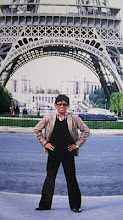Reflecting on good fortune snug on a pedestal
When life was of prophetic indications pulsating
Looking to the sky clouds bidding as palatable
A tussle to recollect images of a pretty plaything
What of sweet recollections?
Gracious imaginations with mutual feelings of awe
Boy and girl whispering sweet nothings manifold
Insisting on a sacrifice towards a future together
Warm memories nostalgic in part but put on hold
What of uncanny acquiesce?
The winter of their life together devoid of fears
Meant for each other a relationship so blissful
What kept alive little anecdotes of yesteryears
Two hearts locked in place exquisitely beautiful
Sherry: I always admire marriages that have stood
the test of time. I love this poem, Hank, and the loving story it tells.
Hank: There
comes a time in a man's heart, the recollections of those moments in time. It
has been said. one remembers only too well an odd moment of grazing one's knee
in a fall, more so the sweet moments of being together.
Reflecting on such nostalgic moments together of
times long ago can be therapeutic to the lonely heart. It culminates in this
poem!
Sherry: And does it so well! Thank you, Hank. Buddah wrote a poem recently which also speaks to marriage, and the wonder of seeing the beauty of one's mate, growing richer with the passing of the years. Let's read.
(Frasier, Phillipe and Mosk)
from the kitchen:
she was with him,
my beloved grandson,
and she was
so respectful,
and warm
and fun.
She was always
the woman I married,
but somehow,
I’d never seen
this woman before:
someone who consented
to share my life
and my fortunes,
a woman with a bounty
of lustrous eyelashes,
inviting curvature,
and an oasis smile.
She gives him
her truest,
most unguarded
laughter and joy,
and he is forever changed
one lesson at a time.
I see her expressing
the purest version of love
I’ve ever witnessed,
and the thought comes,
unbidden:
“That’s the woman
I want to make love to.”
Sherry: I love just knowing that marriages like this exist, Buddah! This is so heartwarming.
Buddah: The poem is about my wife playing with our grandson,
and it brought out such love and desire, well, it's hopefully self-explanatory.
Sherry: I love it! Lee San's poem is addressed to his wife, also, in a much sadder situation.
the eyes
are the open windows
to the soul
and in the moments that i look
deep into them
though they are clouded
because of the pain
they still burn with a flame
of fight
your eyes
smile like the first day
i met you
though there is a flicker
of regret
knowing that our days
together
will be like sand out of
our fingers
my eyes
are the dikes breaking
please don't
let her see my weakness
my fears
but a single tear
warm and salty rolls down
my cheeks
and then a frail hand touches my face.
are the open windows
to the soul
and in the moments that i look
deep into them
though they are clouded
because of the pain
they still burn with a flame
of fight
your eyes
smile like the first day
i met you
though there is a flicker
of regret
knowing that our days
together
will be like sand out of
our fingers
my eyes
are the dikes breaking
please don't
let her see my weakness
my fears
but a single tear
warm and salty rolls down
my cheeks
and then a frail hand touches my face.
Sherry: This is so moving, Lee San, the tears, and her frail hand reaching out to comfort you.
Lee San: I wrote this poem more than ten years ago, when on
an idle day, I was thinking about my late wife. She had radiotherapy treatment
for cancer, and the side effects were awful. I was thinking, she had put up a
good fight, but why was she still taken away? These flashbacks happen, I
guess, even though I thought one had gotten over it. Anyway, the poem was
sitting in my PC for some time. I thought it might be too personal to publish,
but recently, I took it out, edited it majorly, and, yes, to push the publish
button.
I think our memories and experiences, heartaches included, are deep wells from which we can dredge materials for our poetry.
I think our memories and experiences, heartaches included, are deep wells from which we can dredge materials for our poetry.
Sherry: Thank you for sharing this, Lee San. I am so
sorry that happened to you and your wife. I don’t think we ever get over such a loss; it just comes
to live inside us.
Sigh. These poems move me. Thank you, gentlemen, for writing and sharing them. Do come back, friends, to see who we talk to next. Who knows? It might be you!























